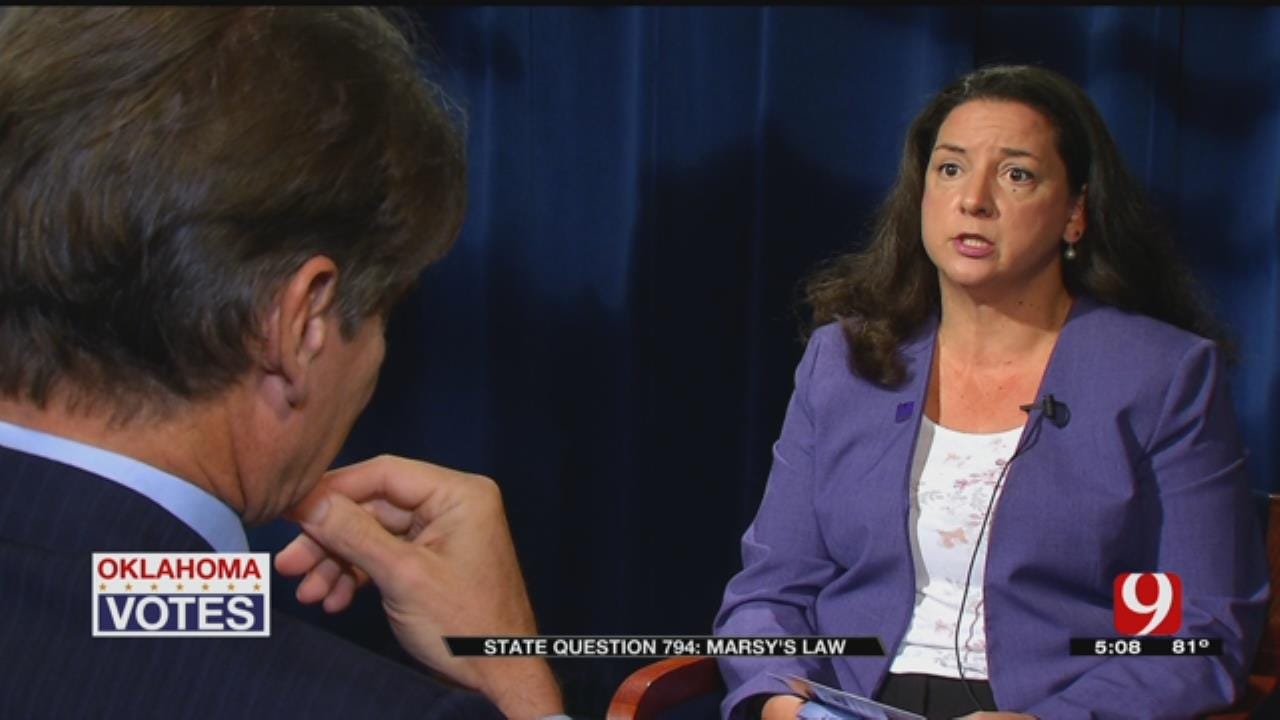'Marsy's Law' To Increase Protections For Crime Victims In Oklahoma
<p>Among the five state questions that will be on the ballot next month is a measure to replace the state's current constitutional protections for crime victims with a victims 'bill of rights' that will be taken more seriously. </p>Tuesday, October 2nd 2018, 6:51 pm
Among the five state questions that will be on the ballot next month is a measure to replace the state's current constitutional protections for crime victims with a victims 'bill of rights' that will be taken more seriously.
That's what supporters say passage of State Question 794, Marsy's Law, will do.
Marsy's Law gets its name from Marsalee "Marsy" Ann Nicholas, a college student in California who was murdered by her ex-boyfriend in 1983. A week later, her brother and mother ran into her accused killer in a grocery store, completely unaware that he'd been released on bond.
"You tried to move on, you tried to put your life back together," says the narrator in an ad supporting SQ 794, "until one day, you see him, the criminal who tore your life apart."
Scenarios like this are very real, according to local advocates for Marsy's Law, and are one reason they say voters to should approve it.
"What we're trying to do is elevate certain rights for crime victims into our constitution," explained Kim Moyer, state director for Marsy's Law Oklahoma.
Moyer is leading the effort to make Oklahoma the sixth state to get Marsy's Law on the books. Other states, including Oklahoma, have enshrined crime victims’ rights in their constitutions, but Moyer says this would take it to another level.
"That's what constitutionality will bring," said Moyer. "I mean, when you think about it, every person who swears an oath to uphold the constitution, and they deal with criminal justice, is going to have to be trained to think about this, and actually implement it."
In 1996, Oklahoma voters overwhelmingly approved SQ 674, which called for crime victims to be treated with dignity, receive notification of proceedings related to their case, and be paid restitution, among other things. But Moyer says there was no mechanism to help implement those rights and also no recourse for victims who felt their rights were being violated.
"SQ 794 spells out that, if these rights are not upheld," Moyer explained in an email, "the victim or survivor can petition the court presiding over the jurisdiction to insure they are upheld."
Specifically, SQ 794 says victims have: the right to be treated with courtesy, fairness and respect, the right to receive timely notification of proceedings, the right to be present and provide input to the prosecutor before a plea agreement is finalized, and the to be heard at all court proceedings that may result in the offender's release, and the right to restitution.
Moyer says this will require a change in thinking among law enforcement and legal authorities, but says victims’ rights have to be guaranteed, in the same way a suspects’ rights currently are guaranteed.
"Nobody would be cavalier about executing Miranda rights for somebody who was accused of a crime," said Moyer. "We want that same kind of attention to detail placed when it comes to crime victims."
There is no organized opposition to SQ 794 in Oklahoma, although in other states where Marsy's Law is on the ballot, the ACLU and some legal groups have raised concerns that, as well-intentioned as it is, it could threaten due process, slow the wheels of justice, and strain resources for victims.
Moyer says there's no evidence that's happened in other states where it is already in place.
More Like This
October 2nd, 2018
November 13th, 2024
October 28th, 2024
October 17th, 2024
Top Headlines
January 15th, 2025
January 15th, 2025
January 15th, 2025
January 14th, 2025













